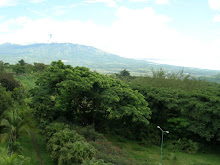Sometime ago I posted about a fairytale that ended as a nightmare (see here).
Indres was the only one care enough to ask, yet I didn't feel like telling what it was about. (Thanks for asking, Dres). Anyway, I just want to let you know that I've decided to wake myself ... and let the nightmare stays as a nightmare. A nightmare is just a dream after all, not reality, isn't it?
Monday, 29 January 2007
Monday, 15 January 2007
'Scientific knowledge' vs 'Local Wisdom'
One of the places I visited on our new year journey was Merapi.
Being there, seeing the bunker where two people were 'trapped' few
months ago. According to the people there, the bunker was built to
protect people from 'hot cloud', not from vulcanic material. Hence
when facing vulcanic material, it was not a safe place.
Fyi, last year the meteological body predicted that Merapi would be
erupted, while Mbah Maridjan, known as the 'juru kunci' -- key keeper
-- of Merapi said it would not. And it turned out that it was not
erupted.
Listening to the local people, how they explained Merapi as an unseen
kingdom, where the palace is, where the road is, etc made me wonder. As non-scientific as it might sound (I must confess: it didn't sound
scientific at all to me), isn't there wisdom behind it?
Isn't their belief a result of observations for many generations? When
they said not to build anything in a specific place (they said it's
the palace of the unseen kingdom), isn't it because they know IF
Merapi erupts, that's where the lava passes?
Should we, when studying and learning about scientific knowledge,
abandon this kind of wisdom?
Being there, seeing the bunker where two people were 'trapped' few
months ago. According to the people there, the bunker was built to
protect people from 'hot cloud', not from vulcanic material. Hence
when facing vulcanic material, it was not a safe place.
Fyi, last year the meteological body predicted that Merapi would be
erupted, while Mbah Maridjan, known as the 'juru kunci' -- key keeper
-- of Merapi said it would not. And it turned out that it was not
erupted.
Listening to the local people, how they explained Merapi as an unseen
kingdom, where the palace is, where the road is, etc made me wonder. As non-scientific as it might sound (I must confess: it didn't sound
scientific at all to me), isn't there wisdom behind it?
Isn't their belief a result of observations for many generations? When
they said not to build anything in a specific place (they said it's
the palace of the unseen kingdom), isn't it because they know IF
Merapi erupts, that's where the lava passes?
Should we, when studying and learning about scientific knowledge,
abandon this kind of wisdom?
Season of fruits
On new year period, I was travelling and throughout my journey I saw
trees with ripe fruits everywhere. Durians, rambutans, jackfruits,
lengkeng ... The end of the year is indeed the season of fruits.
Tuesday, 9 January 2007
Digital Tsunami
Digital Tsunami ... it's a term use by Kompas to describe the
situation where many Asian countries were plugged off the internet
world as a result of Taiwan's earthquake.
The analogy it bears is striking. While the effect of Aceh's tsunami
was beyond doubt, in the digital world this one is remarkably
disastrous. The fact that both happened on 26th of December is even
more striking ...
Subscribe to:
Comments (Atom)
